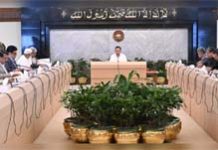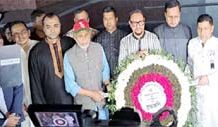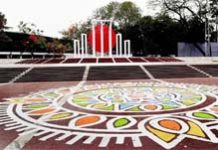C T Online Desk: Only 50,000 workers have migrated to Malaysia in the past five months since the market was opened for Bangladesh in August after a suspension of the process in September 2018.
Migration experts said that the number of migrants sent to Malaysia could have been higher if migration costs could be controlled and a fair recruitment process could be ensured.
‘We had scope to send more workers if we could solve the problems in the migration process,’ said CR Abrar, executive director of the Refugee and Migratory Movements Research Unit.
Against this backdrop, Malaysia’s newly formed government’s home minister, Saifuddin Nasution Ismail, is scheduled to arrive in Dhaka today on a two-day visit to hold meetings with Bangladeshi authorities over the recruitment process.
During his visit to Bangladesh, he is expected to meet with home minister Asaduzzaman Khan and expatriates’ welfare and overseas employment minister Imran Ahmed about the issue.
Malaysia is the fourth most popular destination for Bangladeshi workers, with over 11 lakh migrants to the country in past years.
In 2018, over 175,000 Bangladeshi workers migrated to the country until the process was stopped.
Bangladesh sent only 50,090 workers to Malaysia in five months in 2022 after the market was reopened, according to Bangladesh’s Bureau of Manpower Employment and Training.
Migration experts suggested the new Malaysian government and Bangladesh authorities initiate a fresh recruitment process, protecting workers’ rights and minimising costs.
Mohammed Abul Basher, president of the Bangladesh Association of International Recruiting Agencies, shifted responsibility for the lengthy hiring process to Malaysian authorities, claiming that Bangladesh was subject to a unique manpower hiring system that was not applicable to the other 14 countries from which Malaysia sources its labour forces.
He said that the Foreign Workers Centralised Management System, applicable only to Bangladesh, made the recruitment process slower while workers lost interest in migrating to Malaysia due to high migration costs.
Migrants said that presently, recruiting agents are collecting an average of Tk 3.5 lakh from a migrant, while the government has fixed Tk 78,990 as the maximum migration cost.
Basher urged the Malaysian authorities to introduce a unified recruitment process for all countries.
Ovibashi Karmi Unnayan Programme chairman Shakirul Islam said that the migration process Bangladesh was following for Malaysia was not a fair and accountable process.
As the recruitment process is not fair, many complaint factories in Malaysia are unwilling to hire workers from Bangladesh in the face of pressure from brands and buyers, he said.
He asked the government to ensure an accountable and fair recruitment process, with the rights of workers protected.
BAIRA secretary general Shameem Ahmed Chowdhury Noman said Malaysia’s market frustrated aspiring migrants as well as recruiting agents.
He said that if the Bangladesh government could control the process, more workers could have gone to Malaysia.
Recruiters said that the medical process took over two months, whereas it could be done in two days.
Visa and demand letter issuance also took longer than expected, they said.
Migration to Malaysia resumed on August 8, 2022, eight months after Malaysia and Bangladesh signed a memorandum of understanding in December 2021.











